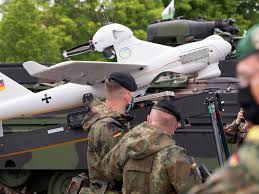Germany to Equip Military with Kamikaze Drones in Historic Move
- Apr 7, 2025
- 2 min read
In a significant shift in defense strategy, Germany is set to equip its military with loitering munitions—commonly known as exploding drones—for the first time. This decision underscores Germany's commitment to modernizing its armed forces in response to evolving global security challenges.
Loitering munitions are a hybrid between drones and missiles. They can remain airborne over a designated area, identify targets, and strike with precision upon command. This technology has been notably effective in recent conflicts, offering militaries enhanced operational flexibility.
The procurement of these drones marks a departure from Germany's traditionally cautious stance on armed unmanned systems. Historically, debates centered around ethical considerations and the potential for misuse. However, the current geopolitical climate, particularly the conflict in Ukraine, has highlighted the necessity for advanced defense capabilities. Both Russia and Ukraine have demonstrated the effectiveness of loitering munitions, prompting Germany to reassess its position.
Defense ministry sources indicate that contracts with two defense companies are imminent, with the army, air force, and navy set to conduct comprehensive testing in the coming months. This initiative aligns with Germany's broader efforts to enhance its military readiness amid uncertainties in global security dynamics.
European Defense Collaboration >
Germany's decision also reflects a broader European trend towards collaborative defense initiatives. In November 2024, several European nations agreed to jointly develop missile defense systems, electronic warfare capabilities, and loitering munitions. This collective approach aims to bolster Europe's defense posture and reduce reliance on external allies.
As Germany integrates loitering munitions into its military arsenal, it signals a proactive approach to contemporary defense challenges. This move not only enhances Germany's operational capabilities but also contributes to the broader objective of a more self-reliant and resilient European defense framework.





Comments